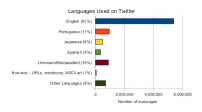Twitter Goes International - Does It Have A Chance?
The majority of Twitter users are still from the US but other countries are catching up fast. As US growth is decreasing dramatically Twitter needs to internationalize fast to continue their growth.
How to do so? First, individual language versions are a prerequisite for success. Only after Facebook localized their website with a specific language version did it take off in Germany, making it the largest social network in Germany with about 11 million unique visitors at the end of last year. With the roll-out of five language versions, the latest being German, Twitter is hoping to catch onto the international markets.
Second, it needs to build critical mass. With the web-savvy local Internet "gurus" already being on Twitter this shouldn't be too hard. Their involvement ensures constant press coverage and interest of the masses.
Third, the tweets need to be interesting. Obviously, a lot of tweets are about people talking about themselves and you could argue about the quality of that information. More importantly though, tweets need to be understood. Not all people are excellent in English so many interesting tweets end up being "non-sense" to the international audience. Many first generation non-English Twitter users have therefore either set up two twitter accounts or are tweeting in two languages. But these workarounds don't really work well as Twitter is supposed to be easy and fast to use. Switching between accounts is a nuisance which the masses of users are not willing to do.
This natural language barrier stops the information flow and makes Twitter as an information source less attractive. Traditionally, news in English have been picked up by the local media and translated into the respective language. With millions of tweets from millions of people every day this approach doesn't work anymore. Maybe one solution could be that we start seeing translated retweets. Maybe we will start seeing more local competitors like the Polish blip.pl. Comparing it with the social bookmark market, the same language barrier principle (tagging the websites with relevant keywords) applies here. As a result, many local bookmarking services are preferred over delicious. However, the local competitors' challenge will be building up the critical mass. Maybe Twitter will add features such as automatic language recognition to deliver just the tweets the following user really wants and understands. Localizing the search experience by allowing the user to set their "local trends" profile is the first step into the right direction.
Dr. Andreas Schroeter is co-founder of bab.la (http://bab.la/). bab.la is an interactive language portal offering bilingual dictionaries, vocabulary lessons, language quizzes, and language games all for free. bab.la recently launched a Twitter dictionary interface (http://twitter.com/babladict), permitting Twitter users to translate words via Twitter.
###

